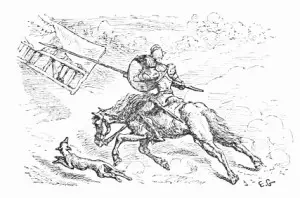A Soldier cared for his Horse during war. After the war, care was not so much. When war came again, the Soldier had to go alone as the Horse was not fit.
Care defines ability.
A Soldier cared for his Horse. So long as there was war, he fed him carefully and treated him as almost an equal. But, when the war ended, the Soldier only gave him chaff to eat and made him carry heavy loads; he treated the Horse badly. After awhile, war was again declared and both Soldier and Horse were called to duty. The Soldier put military trappings on the horse and mounted clad in a coat of mail. The Horse immediately fell down under the weight. He said to his master: “You must now go to war on foot, for you have changed me from a Horse to an Ass and you cannot expect me to change back in a moment.”

JBR Collection (The Knight and His Charger)
A certain Knight, in time of war, took great pains to keep his Horse well fed and cared-for, and in first-rate condition. When the war was over, the Knight’s pay was reduced, and he allowed his Horse, that had carried him nobly through many a hot engagement, to be used for dragging huge logs of timber, and for hire in many other rough and disagreeable ways. Being thus hardly fed and badly treated, the animal’s strength and spirit fell away. It was not long before the war was renewed, and the Knight, taking his Horse to himself again, tried, by good feeding and better treatment, to make him into a battle-steed once more. There was not time for this, however; and the Horse, as his weak legs gave way under him in a charge, said to his master, “It is too late now to repair your neglect. You have degraded me from a Horse into an Ass. It is not my fault that I can no longer bear you as before.”

Townsend version (The Horse and His Rider)
A horse soldier took the utmost pains with his charger. As long as the war lasted, he looked upon him as his fellow-helper in all emergencies and fed him carefully with hay and corn. But when the war was over, he only allowed him chaff to eat and made him carry heavy loads of wood, subjecting him to much slavish drudgery and ill-treatment. War was again proclaimed, however, and when the trumpet summoned him to his standard, the Soldier put on his charger its military trappings, and mounted, being clad in his heavy coat of mail. The Horse fell down straightway under the weight, no longer equal to the burden, and said to his master, “You must now go to the war on foot, for you have transformed me from a Horse into an Ass; and how can you expect that I can again turn in a moment from an Ass to a Horse?”

Equus et Eques
Eques equum, quamdiu bellatum est, alebat hordeo pascebatque faeno. At, cessante bello, cum deinceps pax fuit et stipendium eques ex publico non amplius accepit, tunc equus iste saepius ex silva crassos ad urbem deducebat truncos, ac mercede onus alias aliud ferebat, vilibus ex stipulis sustentans animam. Clitellas etiam dorso gestabat, non iam ephippia. Ut vero rursus ante moenia novum insonuit bellum iussitque tuba cunctis clypeos detergere, curare equos et ferrum acuere, equum dominus ille, iniecto freno, produxit inscensurus. Ast equus obliquo claudicabat pede, non amplius valens viribus, dixitque, “Accenseto hoplitis te peditibus. Qui enim ex equis ad asinos me transtulisti, quo rursus modo equum ex asino me restitues?”
Perry #320
